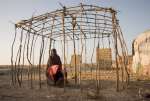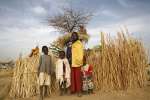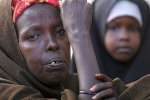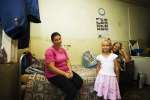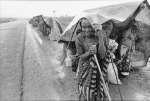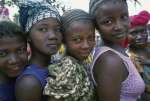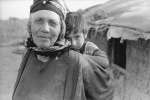- Text size
 |
|  |
|  |
| 
- Français
ExCom: Despite gains in 2008, UNHCR says too many refugees face intolerance and denial of their rights
News Stories, 8 October 2008

GENEVA, October 8 (UNHCR) – The UN refugee agency's top protection official said Wednesday that despite some gains over the past year, far too many refugees and asylum seekers still face intolerance and denial of their rights.
In an address to the annual meeting of UNHCR's 76-nation Executive Committee in Geneva, Assistant High Commissioner for Protection Erika Feller presented some of the main findings of UNHCR's Note on International Protection for this year.
Noting that this year marks the 60th anniversary of the Universal Declaration of Human Rights, Feller reviewed the international community's performance on refugee protection issues and described the past year as "not the worst, but certainly not the best of times."
On the positive side, she said, many states have delivered on their humanitarian and human rights responsibilities to provide asylum and protection, helping millions of refugees to enter, to stay and to ultimately find lasting solutions.
"Last year, more than 700,000 refugees were able to return home, while some 70,000 are benefiting from resettlement opportunities made available by an ever growing and diversifying group of resettlement providers," Feller told delegates on the third day of the five-day meeting.
"New laws in a number of countries have extended the rule of law in displacement situations, including through more enlightened provisions in key areas such as sexual and gender-based violence. The right to a nationality has been underpinned through serious efforts on the part of states to ensure the necessary documentation is available to formally record births, deaths or marriages."
On the negative side, Feller cited the "still disturbing number of refugees" who do not enjoy the rights which refugee law formally guarantees them.
"UNHCR's ability to extend protection is challenged in many regions by the absence of political will to support it and the disinclination to recognize that asylum is a non-political and humanitarian act," she said. "Asylum is viewed through the security prism in many parts of the world. This has meant denial to specified groups of access to the existing asylum procedures, with forced return or refoulement [forced return] a repeated occurrence."
More broadly, Feller said, racism and exclusion appear to be on the rise in many parts of the world. She also cited a resurgence in anti-foreigner sentiment, including in some countries with previously solid records of support for asylum and refugees.
"Intolerance has many faces," she said. "Intolerance is obviously not solely linked to refugee arrivals, but it is part of the asylum equation, in subtle and not so subtle forms. It impacts border control measures, refugee status decisions, resettlement and integration programmes, and the sustainability of refugee and asylum policies in many countries."
The public image of asylum seekers and refugees has suffered amid a proliferation of negative labels describing them as "illegal," "bogus," "failed" and other pejorative terms, she said.
"The proliferation of labels has been described as a messy political response to a confusing problem for receiving states, which is serving to badly distort the refugee concept," Feller added.
The Assistant High Commissioner acknowledged that governments have many interests to reconcile in fulfilling their obligations as signatories to the 1951 Refugee Convention.
"These must obviously include the security of their populations, the integrity of borders, the protection of the environment and the prosperity of the country as a whole," she said. "These interests are, though, only well served by proper implementation of the international protection regime by all states, and damaged where non-implementation becomes a chronic problem."
Nearly 150 nations are signatories to the Convention and/or its 1967 Protocol, making it a universal framework, Feller said. The failure by some states to perform to Convention standards, however, is detrimental to those other states which do comply and take implementation seriously.
"It can disturb burden-sharing, distort the operation of the system internationally, provoke secondary movements and complicate responsibility sharing arrangements," she said. "Non-implementation also impedes UNHCR's own capacity to assist and be a protection partner of host states."
Burden-sharing among states is essential to ensure equitable and consistent responses to refugee situations globally. Currently, the burdens are unfairly spread, with the majority of refugees in countries that do not have the resources to meet their needs, Feller said.


